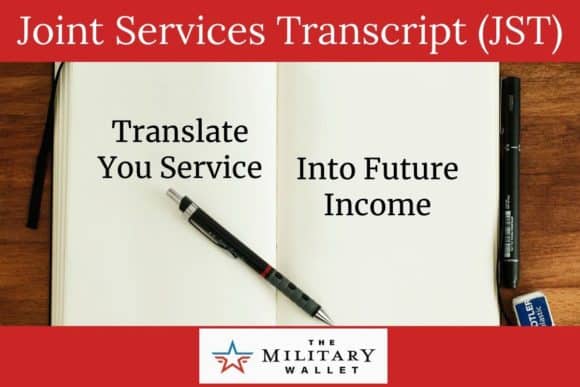Table of Contents
As it turns out, your military occupational specialty (MOS) and training can translate into some serious college credit. The Joint Service Transcript (JST) serves as the bridge between military experience and civilian application.
What is a Joint Service Transcript?
The JST is a record outlining the military schools, training, certification and experiences that may replace similar college course offerings. There is not a whole lot of differences between the JST and other more traditional college transcripts conceptually. One major benefit of the JST program is the translation of your service record is done for you. Potential examples of military schooling you may receive applicable credit for include:
- Advanced leadership courses
- Specialized science, medical, or computer training programs
- Basic training
- Completed testing
The JST is a useful tool that can be helpful for both colleges and resume skill evaluation. Your JST can be found online where users will create an account. The program is a collaboration between the Department of Defense and more than 2,300 colleges and institutions.
Who Can Get a JST?
The JST is available for both active-duty and veteran military service members across all branches except the Air Force. The Air Force has a similar program called the Community College of the Air Force (CCAF) which provides similar options.
While any service member can receive or view their JST, there is a designation between “official” and “unofficial” transcripts as far as most colleges are concerned. An official transcript is when your JST is mailed or delivered to the college directly or sometimes in a sealed unopened envelope. An unofficial transcript is a copy of your JST which you possess and have opened.
It may prove helpful to request and hold onto your own copy of your JST to use as a reference. Conversations about admission, what would or would not transfer as college credit, or simply what skill sets for resume.
What Does Your JST Say?
There is no debate that the civilian and military world are completely different. The military world is full of acronyms, layers of military jargon and jobs appearing to have no civilian counterpart at first glance.
This misconception could not be further from the truth. The JST program is a great example of the collaborative progress made to ensure veterans transition successfully from one chapter of their lives to the next. The old saying a grunt’s only option in the civilian world is jobs like a SWAT team, guard or police officer is no longer the case.
Having a comprehensive tool to describe your professional military career is a step in the right direction. The transcript is a great place to start for any new career path, like when going through programs such as Hiring Our Heroes.
What are the Benefits of JSTs?
The saving of time and money are the top benefits of the JST.
College is expensive, and even with G.I. Bill benefits, every penny saved is a penny you did not have to spend. By transferring in as many credits you can from military service, you can save hundreds if not thousands of dollars worth of benefits to designate for your children or spouse. Every college course your military service covers will not count against your G.I. Bill benefits in any way. If saving more of your G.I. Bill benefits is something that interests you, consider looking into the military Tuition Assistance (TA) option. TA is a way to take college courses (primarily online) while on active duty.
While all degrees vary in length, pursuing a degree post-service will require an evaluation of where you stand academically. By utilizing the JST, you may be able to eliminate a fair share of required courses for your degree path.
As noted above, not every college accepts the JST. Researching the right school should include looking into whether or not they would offer transfer credit for your military service or other previous college courses.
Does Everything Transfer?
The short answer is no. Your JST is a full and comprehensive overview of your military service. However, it does not mean every course, action or job description will transfer in the same way. Here are a few things to consider when reading your JST, or when seeking a degree path after service.
The American Council on Education (ACE) provides in-depth reviews of how military courses may transfer into degree pathways. ACE works directly with the DoD to analyze and provide guidance on exactly how your experience turns into credit.
Understand that advanced degrees or degree pathways with highly specialized laboratory requirements or field exercise requirements may not have as many transferrable options depending on your MOS. Regardless the JST is a worthwhile and free service to help you have a successful transition.




About the comments on this site:
These responses are not provided or commissioned by the bank advertiser. Responses have not been reviewed, approved or otherwise endorsed by the bank advertiser. It is not the bank advertiser’s responsibility to ensure all posts and/or questions are answered.